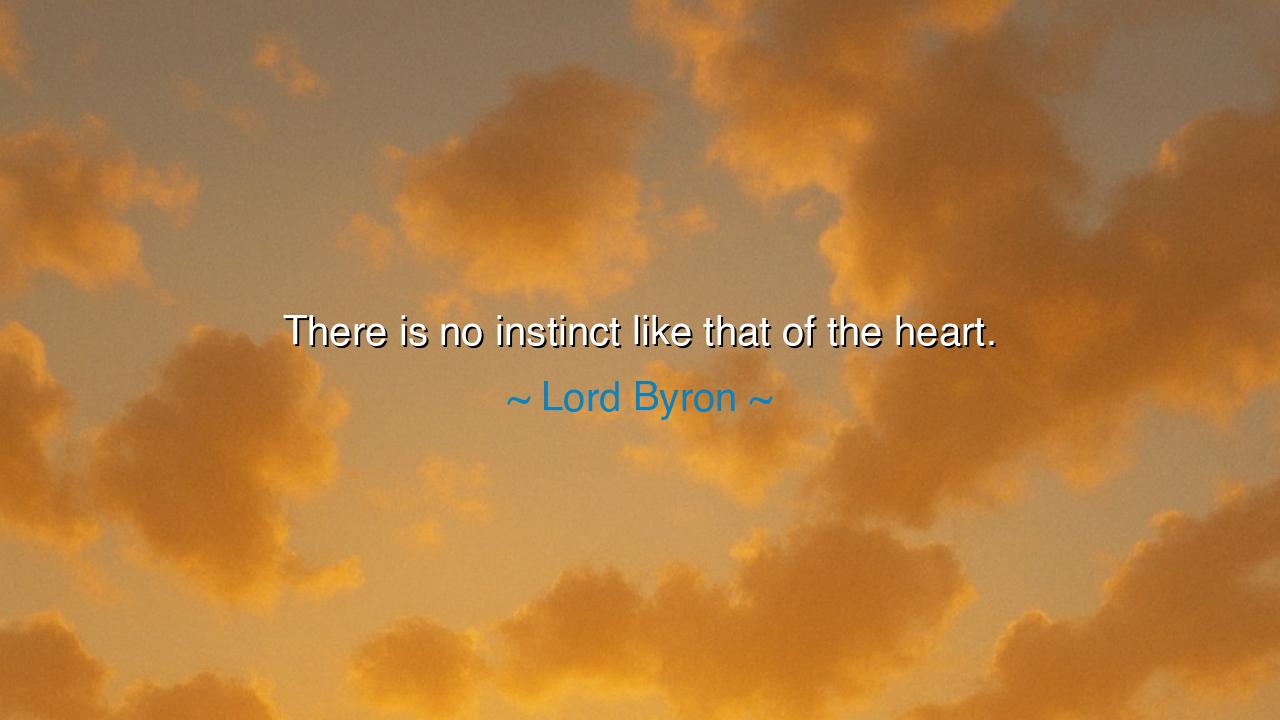
There is no instinct like that of the heart.






Lord Byron, the restless spirit of the Romantic age, once declared: “There is no instinct like that of the heart.” In these words, he gave voice to the most profound truth of human life: that reason may falter, and experience may deceive, but the heart possesses a wisdom beyond calculation. The heart, untrained by books and unchained by logic, speaks with the authority of nature itself. Its instinct is not cold deduction but living truth, guiding us through the tangled paths of love, sorrow, and destiny.
The origin of this thought lies in the very essence of Byron’s life. Known for his passions, his defiance, and his restless pursuit of beauty and love, he understood well that the heart often knows what the mind denies. Reason warns of danger, but the heart urges one forward into love’s embrace. Reason calculates loss, but the heart insists on sacrifice. And though this instinct sometimes leads to suffering, it is suffering infused with meaning, the kind of suffering that ennobles rather than diminishes. Byron himself lived by this creed, often torn by scandal and desire, yet never content to silence the voice of his own heart.
History abounds with examples that echo his claim. Consider the story of Joan of Arc, a peasant girl with no education, no training, and no authority, who nevertheless trusted the instinct of her heart. She led armies, defied kings, and believed with unshakable conviction that she was chosen for a divine mission. Reason would have declared her mad, but the instinct of her heart carried her beyond fear, and her courage turned the tide of nations. Her heart, more than strategy or power, guided her to greatness.
Or ponder the life of Mahatma Gandhi, who listened not to the logic of violence but to the instinct of compassion. When the world insisted that empires can only be broken with war, his heart whispered another path: nonviolence, truth, and love. This instinct seemed foolish to many, yet it shattered the chains of oppression and gave freedom to millions. Here again, Byron’s words ring true: the instinct of the heart often perceives what the intellect is too cautious to believe.
The deeper meaning is this: the heart is the seat of courage, of love, of faith. It recognizes truths that reason cannot measure—loyalty, sacrifice, devotion, the invisible bonds that unite human beings. Those who follow only logic may walk safely, but their steps will be slow, cautious, and small. Those who dare to follow the heart may stumble, may bleed, yet they also soar, for their lives are lived in fullness, not fear.
The lesson for us is clear: when you face choices in life, do not silence the heart. Listen for its instinct, for it will tell you when to forgive, when to love, when to risk, and when to stand firm. The mind may hesitate, weighing endless arguments, but the heart knows in a single instant what truly matters. Trust it, even when the world doubts you, for the instinct of the heart is the echo of eternity within.
Practical wisdom follows: cultivate the heart’s instinct by acts of compassion and courage. Do not ignore its urgings. When you feel the call to help another, act before hesitation chokes the impulse. When you feel love, speak it before time steals the chance. When your conscience burns, follow it though the path be hard. These are the ways to strengthen the heart’s voice until it becomes the guiding star of your life.
Thus Byron’s words stand as a timeless commandment: “There is no instinct like that of the heart.” For the heart alone unites reason with spirit, flesh with soul, man with the divine. Those who follow it walk not in blindness, but in the truest vision of all—the vision of love, courage, and destiny.






AAdministratorAdministrator
Welcome, honored guests. Please leave a comment, we will respond soon